College Catalog: 2013-2014
SSHS: Master of Arts in Sustainability Studies (MASS)
Website: Master of Arts in Sustainability Studies
(MASS faculty come from the following schools: ASB, SSHS, and TAS)
Resources:
The Master of Arts in Sustainability Studies is an innovative and intensive program designed to prepare candidates for a future role as change agents in a world that is rapidly transforming. Ecological, social and economic systems around the world and at local levels are deteriorating and facing potential collapse. These crises present unique challenges as well as extraordinary opportunities. The long-term future of human civilization rests on our success at meeting these challenges by grasping and actualizing the opportunities available to us.
Students move as a cohort through the two-year program, taking two courses each semester. In addition, there is a summer practicum between the first and second years, during which students will get the opportunity to work with a practitioner of sustainability who is acting as an agent of change. This practicum serves as a node point in each student’s journey toward the culmination of the program—their final project. This project will be developed over the entire duration of the program, exploring the diverse perspectives each of the courses brings to bear on the practice of sustainability.
All courses are held in the evening, but this is a full-time program, in terms of work load. In general, the program is designed to deliver a breadth of views on the subject of sustainability practice, from a diverse and interdisciplinary perspective. Courses are often team taught, or have a modular structure, with faculty from a variety of schools being called in to lecture on their particular areas of expertise.
The program draws on a vast pool of expertise represented by the faculty of Ramapo College, to ensure that each student receives the support and advisement necessary for the successful completion of their studies. The Program faculty, themselves, represent a diverse pool of expertise, ranging from sustainability planning and policy to community level assessment, earth system processes, global and local ecological analysis, social processes, economic development, business management from within a sustainability frame, and research methods from diverse perspectives.
Candidates are admitted in the Fall semester only. Review of applications begin on December 1, in the year preceding the Fall session for which admission is being sought. All candidates are required to take the GRE exam, and to submit a statement of purpose accompanied by a Curriculum Vitae, in addition to meeting all other requirements set by the Graduate School. Admission decisions will be made on a rolling basis beginning May 1 of the year to which admission is sought.
Classes will start Fall 2014
- Courses are taken in sequence, and each student must register for both courses being offered each semester.
- A minimum cumulative grade of B must be maintained at all times, for the successful completion of the program.
- Subject & Course # – Title and Course Description
- FALL SEMESTER
- SUST 605 - FOUNDATIONS: SUSTAINABILITY THEORY
- SUST 610 - FOUNDATIONS:NATURAL RESOURCES,PROCESSES & MANAGEMENT
- SPRING SEMESTER
- SUST 630 - METHODS & PRACTICES OF SUSTAINABILITY
- SUST 640 - ECONOMICS OF SUSTAINABILITY
- SUMMER SEMESTER
- SUST 650 - SUMMER PRACTICUM
- FALL SEMESTER
- SUST 660 - SUSTAINABILITY STUDIO
- SUST 710 - PROJECT DEVELOPMENT
- SPRING SEMESTER
- SUST 670 - EXPERT PRACTITIONER SEMINAR
- SUST 720 - CAPSTONE PROJECT






